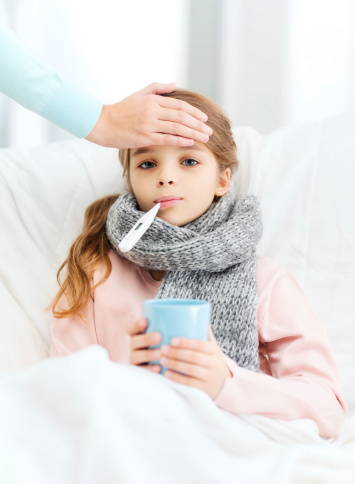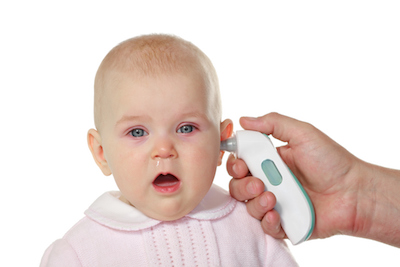How to care for a kid with a cold
It’s that time of year again. Kids are in school sharing all their germs, and everywhere you look someone’s sneezing, coughing, or has a runny nose. Colds are being passed back and forth and no matter how hard you try, your child gets sick. Maybe it starts out with just a runny nose or a sore throat, then before you know it they are coughing, sneezing, and maybe running a fever. So, what do you do about it?
Most of the time, you can take care of your child at home. A lot of times they don’t even have to miss school. What I’d like to talk to you about today is what options are out there to treat your child’s cold, why your child’s doctor often doesn’t give you any medicine to treat it, and some reasons to take your child to a doctor or emergency room when they do have a cold.
What is a cold, exactly?
But first, what is a cold? (I mean, besides being sick with some of the symptoms I’ve listed). Most of the time, this sickness is caused by a virus. Picture a virus as the world’s smallest secret agent. Its job is to get inside your child’s body undetected and take over, making millions of copies of itself in order to take over your child’s cells. So, if your child’s body is like a country, then our secret agent virus is trying to take over the country one house, or cell, at a time. But when a virus takes over a cell, the neighborhood fights back. Your child’s body fighting back against the virus is what causes all the symptoms: the runny nose, sore throat, cough, and fever.
What can you do to get rid of a cold?
 Now, there are literally hundreds of different varieties of viruses out there that cause the same cold symptoms. This is why it’s so hard to treat a cold and why there are no antibiotics or other medicines to get rid of the virus. Your child’s body does a pretty good job of getting rid of the virus on its own, but the symptoms he or she feels while their body fights the virus can be pretty annoying.
Now, there are literally hundreds of different varieties of viruses out there that cause the same cold symptoms. This is why it’s so hard to treat a cold and why there are no antibiotics or other medicines to get rid of the virus. Your child’s body does a pretty good job of getting rid of the virus on its own, but the symptoms he or she feels while their body fights the virus can be pretty annoying.
If there’s no medicine to help get rid of the virus faster, then what can you do to get rid of the symptoms?
Well, as I’m sure you already know, there are hundreds of different products that you can buy at the store that are all aimed at treating the symptoms of a cold. Unfortunately, none of them really work better than another at decreasing your child’s symptoms or making them go away any faster. Without any medicine, children typically have cold symptoms for 7 to 10 days and, with taking one or several cold medicines, children still have symptoms for 7 to 10 days. When studied by scientists, none of the cold medicines you can buy really even decrease the amount of symptoms kids have in those 7 to 10 days.

This is frustrating, to parents and doctors alike. I know nothing makes me happier as a pediatrician than to see kids get better after something I’ve done, and I know the same is true of you as a parent. Against a cold, though, I don’t have a cure. All I have are shelves full of medicines marketed to get rid of cold symptoms, and not one of them has yet convinced me as a doctor that it’s better than another. And with any kind of medicine there are side effects, even with cold medicines, and always the concern for accidentally taking too much. This is especially true in younger kids, which is why we as doctors don’t recommend cold medicine for children younger than six. The risk is just too great for me to accept when I don’t have proof that the medicine works any better than no medicine at all.
What can you do to help your child?
So, where does that leave you as a parent? Your child is still coughing, sneezing, or having a runny nose or fever. First, I want to share some things to look out for that may mean your child is having a harder time fighting off this virus or that something else may be going on. If any of these things are happening with your child when you think they have a cold, the safest thing to do is take them to their doctor or the emergency room:
- Fever greater than 100.4°F in a baby younger than two months
- Fever greater than 100.4°F that you cannot bring down with medicine
- A bark-like cough
- Wheezing, trouble breathing, or breathing faster than normal when your child is not active
- Refusing or unable to drink
- If you think something is wrong
Here’s what to do about your child’s cold symptoms if nothing I’ve just listed is going on.
- Rest
For kids of all ages who are sick, rest is very important. This gives their bodies a chance to use all their energy fighting the virus.
- Hydrate
Making sure they’re drinking fluids is also important, as kids may not feel like eating when they’re sick but need to keep from getting dehydrated.
- Suction (for babies)
In babies, those bulb syringes can help clean out their noses and help them breathe better.
- Honey (for those over 1 year old)
In kids ages 1 to 6, where the risk of overdosing from cold medicines is higher, a little bit of honey (5-10 mL or 1-2 teaspoons) before bed has actually been shown to help kids cough less. It’s important to not give babies younger than one honey, though, because of the risk for an infection called botulism that babies this little cannot fight as well as older kids.
If you do choose to give your child this age cold medicine, please be sure to follow the guidelines on the box carefully and use less rather than more, and if your child is not acting normally, take them to the emergency room. In kids six or older, just remember that all the products you can buy work about the same, so don’t feel like you have to buy the more expensive version. Again, follow the instructions on the box carefully when it comes to the amount of medicine to use.
I hope this helps prepare you and your family for this year’s cold season. Fortunately, most kids make it through without problems, but reach out to your child’s doctor if you ever have any concerns.
You know your child better than anyone else, and if you think something is wrong then it deserves attention.






